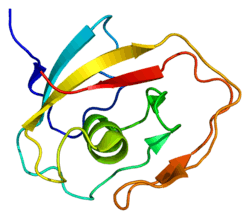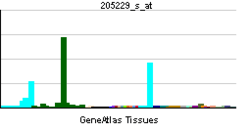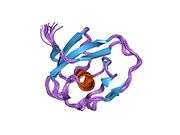Cochlin
Cochlin is a protein that in humans is encoded by the COCH gene.[3][4]
Function
The protein encoded by this gene is highly conserved in human, mouse, and chicken, showing 94% and 79% amino acid identity of human to mouse and chicken sequences, respectively. Hybridization to this gene was detected in spindle-shaped cells located along nerve fibers between the auditory ganglion and sensory epithelium. These cells accompany neurites at the habenula perforata, the opening through which neurites extend to innervate hair cells. This and the pattern of expression of this gene in chicken inner ear paralleled the histologic findings of acidophilic deposits, consistent with mucopolysaccharide ground substance, in temporal bones from DFNA9 (autosomal dominant nonsyndromic sensorineural deafness 9) patients. Mutations that cause DFNA9 have been reported in this gene.[4]
References
- ↑ "Human PubMed Reference:".
- ↑ "Mouse PubMed Reference:".
- ↑ Robertson NG, Lu L, Heller S, Merchant SN, Eavey RD, McKenna M, Nadol JB Jr, Miyamoto RT, Linthicum FH Jr, Lubianca Neto JF, Hudspeth AJ, Seidman CE, Morton CC, Seidman JG (Nov 1998). "Mutations in a novel cochlear gene cause DFNA9, a human nonsyndromic deafness with vestibular dysfunction". Nat Genet. 20 (3): 299–303. doi:10.1038/3118. PMID 9806553.
- 1 2 "Entrez Gene: COCH coagulation factor C homolog, cochlin (Limulus polyphemus)".
Further reading
- Khetarpal U, Schuknecht HF, Gacek RR, Holmes LB (1991). "Autosomal dominant sensorineural hearing loss. Pedigrees, audiologic findings, and temporal bone findings in two kindreds.". Arch. Otolaryngol. Head Neck Surg. 117 (9): 1032–42. doi:10.1001/archotol.1991.01870210104022. PMID 1910721.
- Robertson NG, Khetarpal U, Gutiérrez-Espeleta GA, et al. (1995). "Isolation of novel and known genes from a human fetal cochlear cDNA library using subtractive hybridization and differential screening.". Genomics. 23 (1): 42–50. doi:10.1006/geno.1994.1457. PMID 7829101.
- Khetarpal U (1993). "Autosomal dominant sensorineural hearing loss. Further temporal bone findings.". Arch. Otolaryngol. Head Neck Surg. 119 (1): 106–8. doi:10.1001/archotol.1993.01880130108016. PMID 8417734.
- Manolis EN, Yandavi N, Nadol JB, et al. (1997). "A gene for non-syndromic autosomal dominant progressive postlingual sensorineural hearing loss maps to chromosome 14q12-13.". Hum. Mol. Genet. 5 (7): 1047–50. doi:10.1093/hmg/5.7.1047. PMID 8817345.
- Robertson NG, Skvorak AB, Yin Y, et al. (1998). "Mapping and characterization of a novel cochlear gene in human and in mouse: a positional candidate gene for a deafness disorder, DFNA9.". Genomics. 46 (3): 345–54. doi:10.1006/geno.1997.5067. PMID 9441737.
- de Kok YJ, Bom SJ, Brunt TM, et al. (1999). "A Pro51Ser mutation in the COCH gene is associated with late onset autosomal dominant progressive sensorineural hearing loss with vestibular defects.". Hum. Mol. Genet. 8 (2): 361–6. doi:10.1093/hmg/8.2.361. PMID 9931344.
- Fransen E, Verstreken M, Verhagen WI, et al. (1999). "High prevalence of symptoms of Menière's disease in three families with a mutation in the COCH gene.". Hum. Mol. Genet. 8 (8): 1425–9. doi:10.1093/hmg/8.8.1425. PMID 10400989.
- Kamarinos M, McGill J, Lynch M, Dahl H (2001). "Identification of a novel COCH mutation, I109N, highlights the similar clinical features observed in DFNA9 families.". Hum. Mutat. 17 (4): 351. doi:10.1002/humu.37. PMID 11295836.
- Boulassel MR, Tomasi JP, Deggouj N, Gersdorff M (2001). "COCH5B2 is a target antigen of anti-inner ear antibodies in autoimmune inner ear diseases.". Otol. Neurotol. 22 (5): 614–8. doi:10.1097/00129492-200109000-00009. PMID 11568667.
- Liepinsh E, Trexler M, Kaikkonen A, et al. (2001). "NMR structure of the LCCL domain and implications for DFNA9 deafness disorder.". EMBO J. 20 (19): 5347–53. doi:10.1093/emboj/20.19.5347. PMC 125649
 . PMID 11574466.
. PMID 11574466.
- Robertson NG, Resendes BL, Lin JS, et al. (2002). "Inner ear localization of mRNA and protein products of COCH, mutated in the sensorineural deafness and vestibular disorder, DFNA9.". Hum. Mol. Genet. 10 (22): 2493–500. doi:10.1093/hmg/10.22.2493. PMID 11709536.
- Strausberg RL, Feingold EA, Grouse LH, et al. (2003). "Generation and initial analysis of more than 15,000 full-length human and mouse cDNA sequences.". Proc. Natl. Acad. Sci. U.S.A. 99 (26): 16899–903. doi:10.1073/pnas.242603899. PMC 139241
 . PMID 12477932.
. PMID 12477932.
- Robertson NG, Hamaker SA, Patriub V, et al. (2003). "Subcellular localisation, secretion, and post-translational processing of normal cochlin, and of mutants causing the sensorineural deafness and vestibular disorder, DFNA9.". J. Med. Genet. 40 (7): 479–86. doi:10.1136/jmg.40.7.479. PMC 1735525
 . PMID 12843317.
. PMID 12843317.
- Grabski R, Szul T, Sasaki T, et al. (2003). "Mutations in COCH that result in non-syndromic autosomal dominant deafness (DFNA9) affect matrix deposition of cochlin.". Hum. Genet. 113 (5): 406–16. doi:10.1007/s00439-003-0992-7. PMID 12928864.
- Clark HF, Gurney AL, Abaya E, et al. (2003). "The secreted protein discovery initiative (SPDI), a large-scale effort to identify novel human secreted and transmembrane proteins: a bioinformatics assessment.". Genome Res. 13 (10): 2265–70. doi:10.1101/gr.1293003. PMC 403697
 . PMID 12975309.
. PMID 12975309.
- Lemaire FX, Feenstra L, Huygen PL, et al. (2004). "Progressive late-onset sensorineural hearing loss and vestibular impairment with vertigo (DFNA9/COCH): longitudinal analyses in a belgian family.". Otol. Neurotol. 24 (5): 743–8. doi:10.1097/00129492-200309000-00009. PMID 14501450.
- Usami S, Takahashi K, Yuge I, et al. (2004). "Mutations in the COCH gene are a frequent cause of autosomal dominant progressive cochleo-vestibular dysfunction, but not of Ménière's disease.". Eur. J. Hum. Genet. 11 (10): 744–8. doi:10.1038/sj.ejhg.5201043. PMID 14512963.
- Anderson NL, Polanski M, Pieper R, et al. (2004). "The human plasma proteome: a nonredundant list developed by combination of four separate sources.". Mol. Cell Proteomics. 3 (4): 311–26. doi:10.1074/mcp.M300127-MCP200. PMID 14718574.
PDB gallery |
|---|
|
| 1jbi: NMR structure of the LCCL domain |
|
|


 . PMID 11574466.
. PMID 11574466. . PMID 12477932.
. PMID 12477932. . PMID 12843317.
. PMID 12843317. . PMID 12975309.
. PMID 12975309.